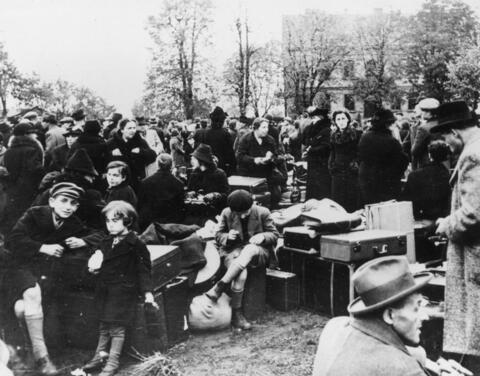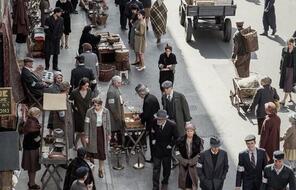Beyond Any Nation’s Universe of Obligation
At a Glance
Language
English — USSubject
- History
- The Holocaust
Throughout 1938, Hitler and his top officials accelerated their campaign against Jews, continually adding restrictions on how they could live their lives. Jews were no longer allowed to own a business in Germany. All Jewish-owned companies therefore had to be sold to “Aryans,” usually at a fraction of their value. In June, the Nazis rounded up Jews who had been previously convicted of crimes in order to remove the so-called criminal element from the population, although most of those arrested had been guilty of nothing worse than a traffic violation. About 500 men described as anti-social were sent to a concentration camp at Buchenwald, a town near Weimar, Germany.
In August, a new law required that by January 1, 1939, all Jews must have a name easily recognized as Jewish. If one’s first name did not appear on an approved list of names of supposedly Jewish origin, the Nazis would add “Israel” to the man’s first name and “Sarah” to the woman’s. In September, the government announced that Jewish lawyers could no longer practice their profession. A month later, Switzerland, which had an open border with Germany that many Jews trying to leave Germany wanted to cross, asked the German government to distinguish between Jews and non-Jews on their passports. Jewish passports were marked with the letter J. After that, only Germans carrying a passport without the letter were admitted into Switzerland.
Jews in German-Polish Border Town

Jews in German-Polish Border Town
Thousands of Polish Jews were expelled by Germany and turned away by Poland in the fall of 1938, leaving them trapped and living in unsuitable conditions along the German-Polish border.
The Nazis then turned their attention to so-called foreign Jews—Jews who, after World War I, had moved to Germany from other countries. Not allowed to become German citizens, they remained citizens of the countries from which they or their families had migrated. By autumn of 1937, the Nazis were expelling all Jews who were citizens of the Soviet Union. Poland’s antisemitic government feared that Germany would expel Polish Jews next. Therefore, in autumn of 1938, the Polish government issued a decree that citizens living outside Poland had to revalidate their passports in order to have the right to return to the country. The decree gave Poland control over how many Jews could return. Although few of them wanted to return to Poland, they needed valid passports to immigrate to any other nation. German officials, worried that Polish Jews would be trapped in Germany, responded to the Polish decree by immediately expelling 14,000 Jewish residents who were Polish citizens. They were brutally transported to the border, where they waited for weeks as neither country accepted them. After Jews already living in Poland agreed to shelter them, the Polish government finally relented and allowed them to enter. 1
Hugo Moses, a German Jew, recalled the day in October 1938 when the Polish Jews were expelled:
The Gestapo suddenly appeared at the homes of all Jews of Polish ancestry in every city in Germany and told them to vacate their apartments within five hours, taking all their moveable goods with them. The unfortunate people packed up the most indispensable of their meager possessions and gathered, weeping and lamenting, at their assembly points. In the city where I was employed, the poor gathered on the busiest square in the middle of the city. The children had been taken out of school and picked up by officials; hungry, frightened and crying loudly, they ran to their parents. The cordoning officials had great difficulty holding back the excited and shouting people who had gathered around the square. A few Aryan men and women who had expressed their criticisms too loudly were led away. An Aryan doctor took out of the crowd a Polish woman who was about to give birth and accompanied her to the hospital. Two days later the child was born.
The others were led away to the railway station and there loaded onto cattle wagons, and we Jewish men used lorries [trucks] and cars to help them load their few possessions until our hands were bleeding in the freezing air. A girlfriend of my daughter’s later wrote to her from a camp on the Polish border: “Had the train run off the rails and killed us all, we would have been better off.” 2
Zindel Grynszpan, a tailor from Hanover, and his family were taken to the railroad station as the streets filled with people shouting, “The Jews to Palestine.” He recalled:
When we reached the border, we were searched to see if anybody had money, and if anybody had more than ten marks, the rest was taken from him. . . .
The SS were giving us, as it were, protective custody, and we walked two kilometers on foot to the Polish border. . . . The SS men were whipping us, and hit those who lingered and blood was flowing on the road. . . .
Then a Polish general and some officers arrived. They examined our papers and saw that we were Polish citizens. . . . It was they who decided to let us enter Poland. They took us to a village [Zbaszyn] of about six thousand people, even though we were twelve thousand. The rain was driving hard, people were fainting. . . . There was no food. 3
Grynszpan’s daughter sent her 17-year-old brother, Herschel, who was living in France at the time, a postcard describing the family’s experiences. Angry and frustrated at being unable to help his family, he walked into the German embassy in Paris on November 7 and shot Ernst vom Rath, a Nazi diplomat. Herschel was immediately arrested. When the diplomat died two days later, the Nazis vowed to avenge his death.
Connection Questions
- How did the Nazis’ campaign against Jews in Germany intensify in 1938? What events and actions before 1938 had made these new laws possible?
- Describe the dilemma faced by Jews in Germany in 1938. How was the dilemma the result of Nazi policies? How was it the result of decisions made by other countries?
- What does this reading suggest about the consequences of being outside any nation’s universe of obligation?
- 1Doris L. Bergen, War and Genocide: A Concise History of the Holocaust, 3rd ed. (Lanham, MD: Rowman & Littlefield, 2016), 107–08.
- 2Uta Gerhardt and Thomas Karlauf, eds., The Night of Broken Glass: Eyewitness Accounts of Kristallnacht (Cambridge, UK: Polity Press, 2012), 21. Reproduced by permission from Polity Press.
- 3“The Trial of Adolf Eichmann,” Session 14, April 25, 1961, The Nizkor Project, accessed May 25, 2016.
How to Cite This Reading
Facing History & Ourselves, "Beyond Any Nation’s Universe of Obligation," last updated August 2, 2016.








